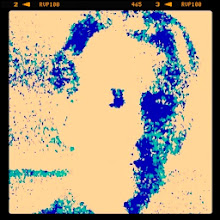Kevin Crossley-Holland is one of the giants of children's fiction, which he's been writing for as long as I can recall - I remember being thrilled by his version of Beowulf when I was at school. More recently his Arthur trilogy has been hugely and deservedly successful, and its lovely pendant, Gatty's Tale is one of my favourite modern novels. He's also, among other things, an acclaimed poet, and the author of the marvellous Penguin Book of Norse Myths.
His latest book, Bracelet of Bones, marks a return to the Viking north. Rather as his Arthur books drew on Arthurian traditions from all across Europe, Bracelet of Bones reminds us that the Vikings didn't just operate in northern seas but sailed and traded as far as Byzantium (Constantinople to us; Miklagard to them). And like Gatty's Tale, the new book is the story of a girl on a journey; Solveig, who sets out to follow her father, a Viking warrior who has gone to join the Byzantine emperor's Varangian guard.
Solveig's odyssey takes her from 11th Century Norway through the heart of what is now Russia, to Novgorod, Kiev, and the perilous cataracts of the River Dnieper. Along the way she encounters kings and craftsman, Christians and pagans, shamans and slaves. There is an ambush by savage Pechenegs (me neither), a meeting with an English spy, and landfall at last in Byzantium itself, a city so teeming with life and detail that it leaves you longing to know more, and looking forward to the sequel (which is already under way, hoorah!). Most of the people Solveig meets are basically good, and few of the bad ones seem completely bad; there is a refreshing absence of real villainy; a sense that people (except maybe Pechenegs) are basically decent.
This is not a fast-moving story. It flows like a river, mostly slow and patient, taking its time, occasionally rushing over sudden rapids of violence and tragedy. I wonder how it will be received by young readers used to the breakneck pacing of many contemporary children's books? I hope they give it a chance, and bring to it the concentration which it demands and deserves. They will be rewarded if they do. It's a rich and convincing evocation of the past, and at the same time a great character study - a tremendous amount of the book takes place in Solveig's head, as her thoughts and memories constantly interweave with the narrative, as do the stories that she knows; the myths and superstitions which often seem as real to her as the rest of her world. It's a book about fathers and daughters, and friendship, and the joys and difficulties of making things: carvings; stories. It's about growing up.
And perhaps more than any of these, it's about language and the love of language: like my other favourite writer, Geraldine McCaughrean, Mr Crossley-Holland is an author whose books need reading at least twice; once for the story, and once for the words themselves.
Philip Reeve
His latest book, Bracelet of Bones, marks a return to the Viking north. Rather as his Arthur books drew on Arthurian traditions from all across Europe, Bracelet of Bones reminds us that the Vikings didn't just operate in northern seas but sailed and traded as far as Byzantium (Constantinople to us; Miklagard to them). And like Gatty's Tale, the new book is the story of a girl on a journey; Solveig, who sets out to follow her father, a Viking warrior who has gone to join the Byzantine emperor's Varangian guard.
Solveig's odyssey takes her from 11th Century Norway through the heart of what is now Russia, to Novgorod, Kiev, and the perilous cataracts of the River Dnieper. Along the way she encounters kings and craftsman, Christians and pagans, shamans and slaves. There is an ambush by savage Pechenegs (me neither), a meeting with an English spy, and landfall at last in Byzantium itself, a city so teeming with life and detail that it leaves you longing to know more, and looking forward to the sequel (which is already under way, hoorah!). Most of the people Solveig meets are basically good, and few of the bad ones seem completely bad; there is a refreshing absence of real villainy; a sense that people (except maybe Pechenegs) are basically decent.
This is not a fast-moving story. It flows like a river, mostly slow and patient, taking its time, occasionally rushing over sudden rapids of violence and tragedy. I wonder how it will be received by young readers used to the breakneck pacing of many contemporary children's books? I hope they give it a chance, and bring to it the concentration which it demands and deserves. They will be rewarded if they do. It's a rich and convincing evocation of the past, and at the same time a great character study - a tremendous amount of the book takes place in Solveig's head, as her thoughts and memories constantly interweave with the narrative, as do the stories that she knows; the myths and superstitions which often seem as real to her as the rest of her world. It's a book about fathers and daughters, and friendship, and the joys and difficulties of making things: carvings; stories. It's about growing up.
And perhaps more than any of these, it's about language and the love of language: like my other favourite writer, Geraldine McCaughrean, Mr Crossley-Holland is an author whose books need reading at least twice; once for the story, and once for the words themselves.
Philip Reeve



No comments:
Post a Comment